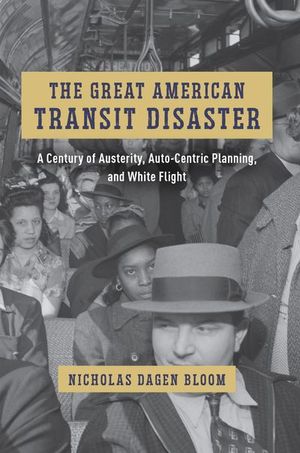The Great American Transit Disaster
Published by The University of Chicago Press
A potent re-examination of America’s history of public disinvestment in mass transit.
“[An] extensively researched and expertly argued exploration of the demise of urban public transit in the United States. . . . Layered and multifaceted.” -Pacific Historical Review
Many a scholar and policy analyst has lamented American dependence on cars and the corresponding lack of federal investment in public transportation throughout the latter decades of the twentieth century. But as Nicholas Dagen Bloom shows in The Great American Transit Disaster, our transit networks are so bad for a very simple reason: we wanted it this way.Focusing on Baltimore, Atlanta, Chicago, Detroit, Boston, and San Francisco, Bloom provides overwhelming evidence that transit disinvestment was a choice rather than destiny. He pinpoints three major factors that led to the decline of public transit in the United States: municipal austerity policies that denied most transit agencies the funding to sustain high-quality service; the encouragement of auto-centric planning; and white flight from dense city centers to far-flung suburbs. As Bloom makes clear, these local public policy decisions were not the product of a nefarious auto industry or any other grand conspiracy—all were widely supported by voters, who effectively shut out options for transit-friendly futures. With this book, Bloom seeks not only to dispel our accepted transit myths but hopefully to lay new tracks for today’s conversations about public transportation funding.
“In this excellent socioeconomic history, Bloom offers a comprehensive and thought-provoking account of the rise and fall of U.S. mass transit, skillfully assessing successes and stumbles so that we may learn from them and correct course.” —Booklist
“A powerful introduction for urban scholars, practitioners, and students interested in American public transit policy.” -Journal of Urban Affairs
“The book’s greatest strength is its hard look at how racism helped ruin U.S. transit.” -Newcity
BUY NOW FROM
COMMUNITY REVIEWS

